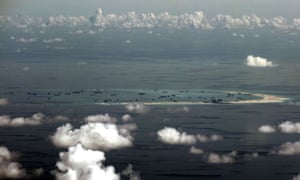Territorial Disputes, China-Japan
"I'm far from optimistic [about China]. Conflict is inevitable in all areas -- cyber, economic, military."
"Our so-called peace was enabled by someone else -- Canadians, Australians and Americans in Korea, for example."
"This [detente between China and Japan] is only temporary. For the rest of my life the China-Japan relationship will be characterized by 'cold peace'."
Tomohiko Taniguchi, special adviser to Prime Minister Shinzo Abe
"China has no intention of engaging in the use of force, not only with Japan, but also with the United States."
"Investment and trade would go down and undercut the economy, on which the credibility of Xi Jinping [President of China] rests."
Satoshi Mirimoto, former defence minister/Democratic Party of Japan government
"They are trying to change the status quo by force in a western Pacific dominated by an American hegemon. We made the same mistake 80 years ago. They will not be successful."
"Is the PLA [People's Liberation Army] a rational player? That's the biggest question for us."
"Pessimism is easy -- people believe you. But China can do democracy, they can change. The turning point is coming within ten years -- will the Communist Party attempt to increase its already tight control, or do they have a [Mikhail] Gorbachev to start reform?"
Kunihiko Miyake, research director, Canon Institute for Global Studies
 |
| Reclamation of Mischief Reef in the Spratly Islands in the South China Sea. China is to build a petrol station on another disputed island in the Paracels. Photograph: Ritchie B. Tongo/AP |
The Japanese people hold their government to a tight standard of non-militarization, a hold-over from the Second World War and the dropping of atomic bombs by the United States -- with which Japan was at war -- on Hiroshima and Nagasaki. When Japan declared it was defeated after those dreadful blasts, the U.S. set about helping the country reestablish itself. And at that time Japan pledged that its military would never again be used for offensive action, only for defense.
The Japanese people were so bitterly averse to their military taking them into the Second World War that traditionally, post-war, members of the military never dared wear their uniforms in public. The Japanese military became accustomed to travelling in civilian clothing, and changing into military uniform only when they had reached military installations wherever they were, in Tokyo or elsewhere. A soldier appearing in uniform in public risked insult and even attack by citizens.
Tokyo's wartime Yasukuni shrine where wartime elite military personnel were buried remains a despised symbol of Japan's military past. That past included an invasion of Korea and another of China. Japanese cruelty to Koreans and Chinese when it occupied those countries was legendary. Korea and China, 70 years after their invasion, occupation and subjection of humiliating and violent suffering under the Japanese military still harbour understandable rage against Japan.
In the present era, it is Japan and its people who are the pacifists and China which is the aggressor. But even thirty years ago on the streets of Tokyo, where courtesy, law and order and public passivity reigned, right-wing groups sometimes drove vans with blatant right-wing signage through the streets, with loudspeakers playing blaring martial music and strident voices barking militaristic slogans; most Japanese simply ignored their presence, going about their quiet business.
Now, however, a gradual recognition has emerged that Japan can no longer suppress the need for it to have a military geared to protecting itself which would have the capacity to do so; "proactive pacifism", giving Japan the right to send forces overseas for the first time since the Second World War has elicited large protests from among the population, against the Abe government which has brought in the concept. The fear that China may be preparing to risk war to achieve its ambitions in the South China Sea has all its neighbours on edge, over mutual territorial claims.
Traditionally, convention had it that Japan's spending on defence would be kept to a minimum. It has been capped at one percent of GDP; amounting to $45.8-billion. China, in contrast, which has increased its military spending by 360 percent in a decade to two percent of GDP, spends $216.4-billion annually. The protection of Japan and Japanese interests has been seen to by the United States, along with other countries in the recent past.
With Japan's push-back over the disputed island which both Japan and China claim in the East China Sea, China has backed up lately, with a more polite facade.
"But does that mean Xi has complete control over the military? I don't think many people would say yes to that question."
Akio Takahara, professor, Graduate School of Law and Politics, University of Tokyo
Labels: China, Controversy, Japan, Military, South China Sea

<< Home